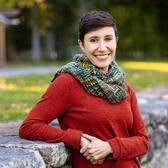'WomenGirlsLadies' ... Fishnets, Food, Feminism
Are younger generations of women "afraid" of feminism? Has the media slashed and distorted women's choices about balancing work and family? Must women vote for female candidates?
For those of us who care about women's issues, these questions have surely surfaced in dinner conversations, the workplace lunchroom, and in the blogosphere, of course. They've also helped set the stage for WomenGirlsLadies: A Fresh Conversation Across Generations -- a touring intergenerational panel that Judith and I attended last week at Harvard.
It's safe to say that women of different generations aren't talking to each other nearly enough. In response to this problem, WomenGirlsLadies brings together four dynamic authors and activists -- born as early as the 1940s and as late as the last day of 1979 -- to explore the facets of feminism and to share how their own life experiences have informed their feminist identities. The unifying sentiment among all of the panelists -- Kristal Brent Zook, Gloria Feldt, Deborah Siegel, and Courtney Martin -- is that controversy and nuance within feminism is a good thing and that complex perspectives and diversity keep feminism alive and evolving. So, too, do these women agree upon the need for common ground -- whether we're voting for Obama or for Clinton, we should all be outraged that in 2008, women comprise only 16% of Congress and still only earn $.77 for every $1.00 earned by men.
Each panelist spoke candidly about life experiences that shaped and/or propelled her feminism. Gloria discussed being a teen mother in the years before the pill, realizing in the 1960s, that if women do not have the right to make autonomous childbearing decisions, other rights can't be exercised. Kristal talked about being raised by her African American mother and grandmother, encountering the works of Black writers, and crafting her own writing on Black women. Deborah told us about the first time she "looked injustice in the face" after traveling to the Soviet Union in 1988 to visit Jews struggling for their religious freedom -- an experience that became pivotal in her understanding of privilege, power, and marginalization. Courtney discussed her friends' struggles with eating disorders and attending Barnard College where, shockingly, no one identified as a feminist at all.
As to how these women understand their feminisms today, I was struck by two generational divides; not the younger-women-for-Obama / older-women-for-Clinton divide, but how feminism is experienced internally vs. externally, and how it operates in isolation vs. how it is synthesized with larger social justice issues including food politics, the environment, international human rights. For Gloria who served as president and CEO of Planned Parenthood between 1996 and 2005, feminism centers upon public advocacy and fighting for legislative changes to protect and advance women's collective well-being. It lives in the public arena. But for Kristal, feminism is "as much about the internal workings of [her] body and heart as it is about addressing social inequalities." It's about personal health and inner peace. Courtney expressed that her feminism is most alive in her relationships, in her writing and blogging, and while out dancing; things with which I very much identified. She stressed the importance of younger women being able to see themselves in feminism; to know that fishnet stockings can be as much a part of feminist identity as square, course shoulder pads; that feminism is not a finished revolution, but is constantly being re-envisioned, redefined, and re-invented.
The panel was intended to be a conversation starter, so now I turn it over to you, fellow Jewesses. What does your feminism look like?







Jordan, As a new board member of the JWA, I'm doubly honored that you attended the WomenGirlsLadies panel and blogged here about it. It is interesting but not surprising to note that for both Deborah and me, absorbing the Jewish sense of social justice propelled us to work for causes like civil rights and gender equality. I imagine there are many Jewish social activists who don't necessarily wear their Jewishness on their sleeves but who are nevertheless strongly motivated by it. I for one am grateful for that tradition.